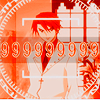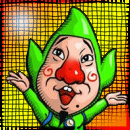I can't believe you just brought up the physical side of this. AGAIN. Are you trying to destroy your credibility?
The accessibility of the references is really not especially important. For instance, you claim that because most people do not know how to translate Hylian, that the content of Hylian texts are irrelevant. Yet it is Hylian text that specifies the nature of the hero's departure in TWW, and the line "journeyed into the flows of time" is used widely by theorists. This line was widely used by theorists to prove that MM and TWW were incompatible because the hero left Hyrule forever, journeying into an alternate
Again, you obviously haven't read my posts, because it was mostly jhurvid who raised the issue of accessibility. At one point, I'd actually forgotten that it was written in Hylian. We don't count cameos and Easter eggs as evidence in any other game, so why should we in TMC? The Hylian in TWW is part of the PLOT. The Hylian text in TMC has no CONTEXT, in TWW it does and it's extremely important to the story. It was obviously added because the way Link left Hyrule was a canonical fact, you can't possibly argue that it was meaningless. The Triumph Forks reference was not put in there to say anything about the story. I'm doubtful that Aonuma has any idea it exists. It was just to make the books look more interesting, and hide some Easter eggs in there for fans.
The reason why you respond unnecessarily to parts of posts that don't need it, or even parts that do, and give an entirely useless response, probably has something to do with your lack of comprehension of context. You respond to each sentence as something entire individual, ignoring any points surrounding it. That's why you make responses that are often unnecessary, and that's why I get pissed off at you. Or more accurately, I get pissed off because you won't even TRY to see things from the perspective of someone else, so you fail to understand how we use context, so you lead arguments in circles. And I'm putting a stop to it.
The way you interpret the games themselves, the way you respond to other arguments, the way you read and respond to other posts in general, and even the way you structure and form your own arguments... All of it centers around this one problem of context, or specifically, a lack thereof. Nobody even knows what your own contention is when you start posting half the time, because you fail to establish a context for your statements, and your arguments lack any proper structure. You often end up posting "evidence", or arguments anyway (often not backed up by evidence, but that's a separate problem), without it being clear what the hell you're trying to prove. Because you don't see the context in the posts you're responding to, or in your own posts. I learnt about structure, coherence and context in high school English, so I'm not sure how you can know nothing about this. If you can't establish a context for your points, they won't make sense to anyone except yourself.
Honestly, I see context as something crucial to the timeline itself. It's something that's VERY significant to the timeline placement of a game like TMC. It's significant to understanding TWW, and the reasons behind its ending and what they suggest. However, in order to comprehend these things, you need to learn to look at the games from a whole new perspective. I'm not saying it will be easy for you, but it's the only way you'll be able to understand where other people are coming from. What you have a habit of doing is looking at quotes in isolation - or worse, looking at just a few words of a quote in isolation. You search for any remotely possiible interpretation, but what you don't realise is that, given CONTEXT (there's that magic word), your use of the quote is actually completely irrelevant, or your interpretation is invalid, and doesn't prove anything. As well as that, your inability to recognise the presence or absence of context has made you incapable of distinguishing between things that DO have context and importance, and things that don't, which where most of our differences on TMC come from.
My use of TWW's ending is pretty much the very definition of how context is applied to the interpretation and analysis of a plot - if you've ever studied novels in depth, you may know what I'm talking about. We can NOT look at each line from the King, or from any other character, in isolation, which is exactly what you do. We have to consider it with respect to the rest of that conversation, the rest of that scene, and even the rest of the game. I'm absolutely positive that I have a stronger understanding of the underlying themes in TWW than you, because I understand the context. And in that, don't think I'm talking about some timeline superiority - I'm talking about the plot and characters itself. I do enjoy that kind of thing, too. Fortunately, this is one case where that informs the timeline itself greatly, too (I know people with a similar understanding who could hardly care less about the timeline, but still don't see why games would be after PH). The same thing comes out of TMC - don't look at the hat, the "first adventure" and the "light force echoes" quotes in isolation. Look at them in the context of the entire game. Of the developer intent. Of the narrative structure. It's all really important!
One question I'd like to ask to demonstrate what I said about TWW in my last paragraph, is this: What were Ganondorf's dying word about? Without the context of TWW, it has absolutely NO meaning, except to sound cool. Think about it for a while, though, because with all of TWW considered, it's actually an amazingly meaningful line. It sums up what the game is about. I'll give you one hint, it heavily relates to the King's dialogue in the same scene (and the one before it). That's kind of too complex to use as evidence, but I think it's an interesting point, and it only has any meaning in context. Once you learn to apply context to the games, you can start applying it to the timeline. And once you apply it to the timeline, you can apply it to your style of debating and posting, too. You may find yourself noticing many things throughout several games in the Zelda series that seem meaningless by themselves, but actually have great significance within their proper context... But up until now, you haven't seen their meaning, and have taken the former approach of disregarding it as meaningless because there's no one quote that proves what is being said.
A perfect example of that would be the cap in TMC, which is a good one to bring up, because its impact on the timeline is more direct and obvious than the Ganondorf example. Out of context, Ezlo giving Link a hat in the game's final moments means nothing. In context, it takes on a whole new significance - you've got the intro backstory, for starters, which literally serves to establish the context of TMC... That's what backstories do, and that's pretty much the basest, most blatant way to create an obvious context - probably because they wanted the meaning of those later scenes in TMC to be obvious. So take the backstory and its hero, then Link at the beginning, then Link at the end, then Ezlo's little comment about the hat, and then the ending text about Link's first adventure. Actually, jhurvid mentioned something about this, when he said (I think, I just remember elaborating on it) that combination of all the aspects of TMC's ending were what made it important, not just any one thing like the "first adventure" part. It all ties together, when you understand the symbolism in it - Link is the first hero to wear a hat like that. Even the backstory hero himself is really irrelevant to the plot and isn't really mentioned in the game at all. He only exists to illustrate this fact, by also being symbolic. He represents past heroes, and Link represents future heroes.
We have all these stupid arguments about Hylian traits and science, neither of which are even in the minds of the developers when they make a Zelda game, so I don't see why we should bother. What the developers are deliberately doing is creating context, and using it to give us hints about the story. Minor evidence, Easter eggs, cameos and the like will pretty much never have any connection to this context, which is why some evidence is much more important than others. And it's why we use the plot of a specific game to determine its intended timeline placement (hints of which will practically always be found in THAT game), not the plot of other games, which will usually say nothing about a particular other game's intent. Where's the evidence in TMC's story for it to be anywhere but first?
















